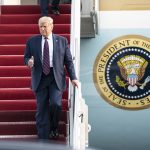Words and grammar have become battlegrounds in a culture war that seems to have lost its way. The left’s insistence on using “they/them” as singular pronouns and the curious approach to capitalizing “Black” while treating “white” as a mere color reflect a twisted sense of linguistic fairness. But fear not, because President Donald Trump, the linguistic warrior we didn’t know we needed, is on the case, challenging this madness head-on.
Currently, there is a fiery clash between the Trump administration and the Associated Press (AP) that serves as a prime example of the battle over language. Trump has made headlines by renaming the Gulf of Mexico to the Gulf of America, and the AP is not taking it lying down. Their resistance to this new moniker has culminated in an actual ban on an AP reporter from covering the White House—a bold move from an administration that understands the stakes.
White House Explains Battle with Associated Press Is About Much More Than Just the Gulf of America https://t.co/awnbEcav0x
— Observing Time (@TimeObserving) February 18, 2025
Establishment media allies have rushed to defend the beleaguered AP, condemning Trump as a bully seeking to stifle one of the largest news organizations on the planet. The irony of this is palpable. With incredible influence comes great responsibility, and it’s high time that someone holds the AP accountable for their role in shaping political discourse with liberal biases.
Trump’s team asserts that limiting access to AP reporters is not merely a petty feud but rather a response to years of the outlet promoting leftist terminology through its influential style guide. The AP Stylebook has been a baseline reference across numerous media outlets, meaning its sway over public dialogue is significant. This raises a crucial question: who keeps the AP in check? It’s a thought that gives even the most optimistic of media consumers pause.
In a bizarre twist, the AP’s vice president of corporate communications dismissed the Trump administration’s criticisms as mere differences of opinion about the stylebook’s guidance. The irony stings—guidance that claims not to carry any particular agenda seems to veer decidedly toward one side. The double standards evident in the AP’s stance on race and language are too glaring to ignore. For instance, the outlet advises that “Black” should be capitalized while “white” should remain lowercase, and their rationale for that distinction is as convoluted as it is biased.
The AP’s guidelines do more than just dictate grammar; they reveal a clear ideological slant. Suggestions to avoid terms like “illegal immigrant” in favor of ambiguous language show a refusal to acknowledge the realities of immigration. They also avoid balanced discussions around contentious issues like transgenderism, which can only signal a troublesome agenda.
Trump’s pushback represents a larger movement seeking to reclaim American language from the clutches of progressive redefinitions. If he secures a victory in this war with the AP, it wouldn’t just be a win for him; it would be a triumph for Americans longing for a return to straightforward and honest language. With the AP’s influential grasp on the media landscape, such a victory would indeed be monumental—making language great again is a task worth fighting for.




